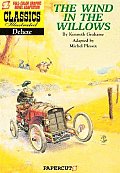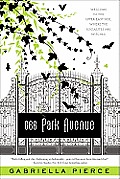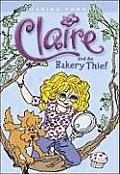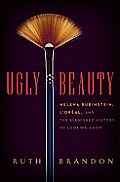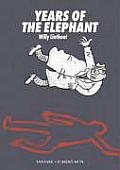Link to this review in the form of a comic strip by geneambaum tagged classic • graphic novel
Link to this review by emilyjones tagged romance • paranormal
Jane Boyle is an American living in Paris until she meets the super rich and super hot Malcolm Doran. He sweeps her off her feet and then off to his Manhattan mansion. But her fairytale engagement is threatened by her newly discovered magical abilities and her future mother-in-law. Malcom’s mom is an evil witch who will stop at nothing to have everything exactly as she wants it: from Jane’s wedding dress to deciding when she’ll get pregnant.
Why I picked it up: I read the cleverly snarky ad for it on Shelf Awareness, entered to win a free advanced reader’s copy, and I got one!
Why I finished it: Having had my own less-than-magical experiences with my mother-in-law, I got a kick out of the supernatural control Jane’s MIL exerts. It’s one thing to insist on a wedding cake flavor, quite another to sabotage job interviews and kill off Jane’s friends.
I’d give it to: Katy and Anna, who both read a bit too much fashionista chick-lit and need a healthy dose of evil magic added to their fluff, and who will both be lured in by the fairytale romance and then freak out at the creepy evil lurking underneath.
Link to this review by gigi tagged chapter book • mystery
Claire moves to the country because her dad bought a bakery there. Claire is not happy about that. She can’t help paint the bakery so she goes exploring with her dog, Bongo, and ends up making a new best friend, Jet.
After the bakery opens, there’s a guy that keeps coming in who looks around suspiciously before he comes in. Claire thinks that’s kind of fishy.
Why I picked it up: My dad gave it to me.
Why I finished it: I liked when the policeman said,” Hello, little girl.” Claire said,” I’m not little.” The next day he said, “Hello, Not Little.”
I’d give it to: My friend Parker who likes cooking because she would like the part where Claire and Jet are baking and make a mess.
Link to this review by geneambaum tagged graphic novel • historical fiction
Luther Levy stopped going to mass with his family. He got into some theological trouble at the university he was attending and failed to graduate. Now he’s facing life as a tutor or working as a clockmaker with his father.
Then he meets Lucien de Saint-Yves who is buying books for the University of Familienwald. Lucien invites Luther to accompany him on his return journey. He’s all but certain Luther will be able to secure a position as a university lecturer. But Luther’s reputation as a free-thinker and his Jewish heritage may be too much to overcome.
Why I picked it up: Erika Moen told me I’d love it.
Why I finished it: Page 74 — it’s pornography for librarians. And as the story goes on we find out that, even in the old days, librarians had to bend the rules to provide good service.
Family Man is being serialized at www.lutherlevy.com, where you can still read the comics contained in this book for free. (But it’s worth buying the book for the glossy paper!)
I’d give it to: Mike, who loves historical fiction and reading about faith. He’d get more than I did out of the discussions of Christian philosophers in the book, though we’d both agree on the value of good cataloging.
Link to this review by sarahhunt tagged mystery • science fiction
Zack is mowing a picture of a wiener big enough to be seen from space into his family’s corn field when he’s stung by a bee. The guy he’s video chatting with gets help as Zack goes into anaphalactic shock. Video of the sting goes viral because everyone thought bees were gone forever. Zack is choppered to a high-security lab to be investigated by scientists hoping to figure out why he was stung. Then four more people in far-flung corners of the planet are stung, too. These five young people become global heroes, a sign of hope for the return of the bees.
Why I picked it up: I loved Coupland’s combination of the funny and the thoughtful descriptions of young software writers finding their way in the world in Microserfs and JPod and keen observations s of how people chase money and meaning in the movie he wrote, Everything’s Gone Green.
Why I finished it: The chapters alternate between each person who was stung. They pulled me into their lives and the ways they connected (or failed to connect) with the people around them. Their stories began to intertwine as they and the pieces of the mystery came together. The book was vivid enough that when I saw a sign at the grocery store apologizing for the poor quality and high price of some products due to late freezes, I felt like I was in Generation A, a world of extreme temperatures and sudden storms where apples are a luxury.
I’d give it to: Carol, who first told me that if you believe in the ability of books to change lives for the better, you have to believe that they can change lives for the worse, too. This book reminded me that stories can give you permission to sail through life while the world crumbles, or give you the strength to connect and create change.
Link to this review by billba tagged graphic novel • romance
Marshall feels that love, and life, may have passed him by. His blind date Natalie is late and, knowing his luck, she’s not going to show. But then she does show, and she’s really cute, and she seems to like him. Something must be wrong.
Why I picked it up: I’ve never quite clicked with Clowes’ work before (it’s usually too dark for me) but David Eicke from Random House Library put this unusually horizontal book in my hands and I promised I’d give it a shot.
Why I finished it: I loved how Marshall’s thoughts obscured Natalie’s words. This is how I always feel when talking to beautiful women, famous authors, and Bill Gates. It was fascinating to see a visual representation.
I’d give it to: Rob, who will appreciate the weird turns Marshall’s and Natalie’s date takes, including an unexpected confrontation with her ex at a party.
Link to this review by flemtastic tagged fantasy • romance • coming of age
Eighteen-year-old Kelsey needs a temp job. She can’t turn down two weeks at traveling circus where she will sell tickets, clean up after shows, and help the tiger trainer feed the circus’ pride and joy, a white tiger named Ren. The tiger and the girl quickly bond, but then it is sold to a mysterious buyer who intends to take Ren to a tiger preserve in India. This man wants to pay Kelsey handsomely to help with the transfer by accompanying Ren for several weeks. When she does, everything upside-down. Ren briefly transforms into a human and declares that Kelsey has been chosen by the goddess Durga to help him break the 300-year-old curse that keeps him trapped in tiger form. Things get stranger as Kelsey helps Ren fulfill the ancient prophecy about his curse while secretly falling in love with him.
Why I picked it up: Fantastic cover, it’s based on Indian mythology, and the teaser promised a love story — it looked perfect for middle school girls.
Why I finished it: At one point, Kelsey and Ren must travel to the Indian god Hanuman’s monkey kingdom to nab the first of four artifacts needed to break the curse. Suddenly, the book becomes an action-packed Indiana Jones-like adventure with blood-sucking trees and pale, bloodthirsty, vampire seahorse monkeys.
I’d give it to: Jillian, who is just old enough for this clean romance that spends pages and pages on first kisses. Krissy, my 7th grade basketball team manager, who hangs out by the drinking fountain discussing the ups and downs of friends’ relationships and would track the tumultuous love story with eager abandon while thrilling to the action sequences, which read like a bit of the traps and explosions of Suzanne Collins’ The Hunger Games.
Link to this review by flemtastic tagged nonfiction • history • biography
Helena Rubenstein and Eugene Schueller were beauty industry pioneers in the early 1900’s, riding a wave of feminine independence, spending money and changing mores. They could not have been more different: Rubenstein was a five-foot tall force of nature who was all about sales and relationships, Schueller was a shy chemist who wanted to use his money and prestige to get involved in politics. In the end, each CEO’s characteristics would damage their company’s bottom lines, Rubenstein because she wanted to be hands-on at all times and would not groom a successor, and Schueller because of actions undertaken for the Vichy government and collaborating with the Nazis. Their companies’ rivalry continued throughout their lives. Their final clash took place in the 1980’s, rivals despite the fact that both founders were dead.
Why I picked it up: It promised dirt on a glamorous industry. Plus I like to read outside of my favorite genres every now and then, just for mental fitness.
Why I finished it: The book is exhaustive in its research of the early history of each company. Schueller, a gifted chemist, created a hair dye that did not poison its users, as did all the others of the time, and started L’Oreal. Rubenstein’s company seemed to be based on her ability to connect with customers in her stores and tap into their deep-rooted desires and fears about beauty. (Brandon pegs Rubenstein’s real age through documents from 100 years ago (she was very coy about how old she was).) This book also waded into age-old debates about beauty.
I’d give it to: My aunt Del, who would bristle at Schueller’s sexism but revel in Rubenstein’s approach. Once, after being denied the right to buy an apartment in NY because she was Jewish, Rubenstein bought the entire building!
Link to this review by geneambaum tagged literary • graphic novel
Charles Germonprez’s son, Jack, committed suicide. Germonprez feels disconnected from his wife, Simone, and can find no comfort at work. Why is his son dead while others live? He goes to great lengths to preserve the outline of his son’s body, drawn by police where he landed on the pavement outside their apartment. He begins to see a therapist who helps him work through his conspiracy theories, suicidal thoughts, and desire to lose himself in alcohol.
Why I picked it up: Fanfare’s Stephen Robson told me about it at Comic Con. He had me at “It’s a Flemish graphic novel.”
Why I finished it: Germoprez’s son is depicted throughout, even in old family photos, as a chalk outline. He’s a hole in the frame where the young man should be. This contrasts remarkably with the odd bits of slapstick and surreal details that make their way into the character’s life despite his sadness.
I’d give it to: The other students in the comics class my daughter and I took recently. Some of them were clearly more comfortable with pencils than inks, and this book is a stunning example of what they can achieve. (Linthout chose not to ink this book because, like his real-life son Sam’s life, he felt the art should be unfinished. This translation reinforces that by using unpolished lettering.)
